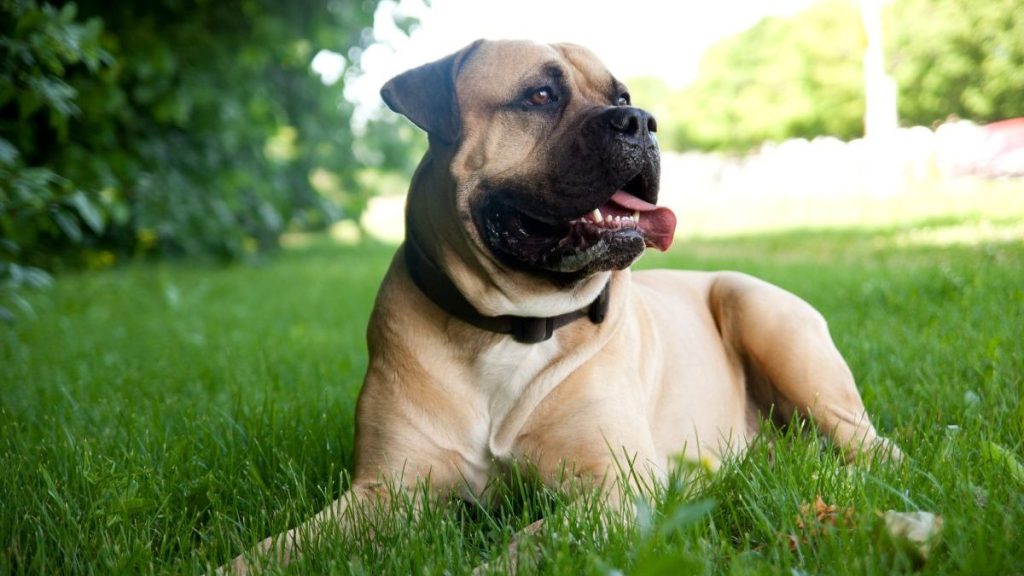Mastiff breeds, with their imposing size and protective nature, have been a popular choice of dog lovers for centuries. While dogs in this family are generally referred to as Mastiffs, there are over twelve Mastiff breeds, all of whom are actually Molossers. If reading this makes your head spin, trust us, you’re not alone. Perhaps most interesting is that there is only one dog breed actually named “Mastiff.”
Molosser vs. Mastiff breeds
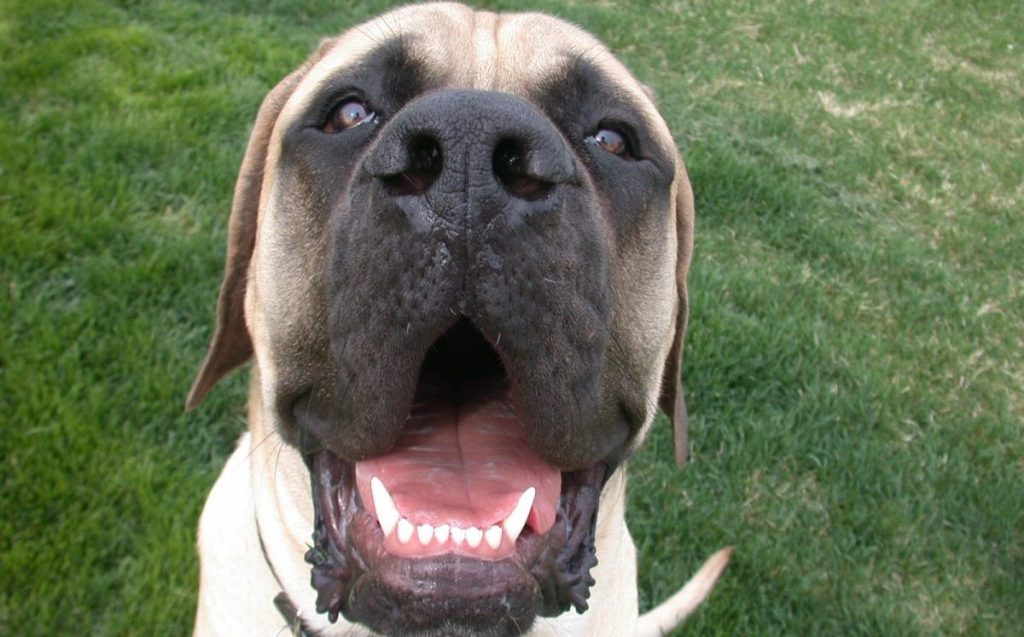
The true Mastiff, also known as the English Mastiff, is part of the Molosser group, a category of working dogs with a shared ancestry. Most Mastiff breeds, the Tibetan Mastiff excluded, trace their lineage back to a common ancient relative, the Molossus. Thought to have been brought to the Mediterranean Peninsula by the Phoenicians, the Ancient Greeks and Romans prized the Molossus for their ferocity and innate hunting abilities. Another theory states Alexander the Great brought these dogs from conquered lands in Asia back to Ancient Greece. Over time, Molossers spread to different regions and various breeds evolved based on needs and preferences.
While the original Molossus dog is now extinct, their ancestral line continues in Molosser-types, including Mastiff breeds and other dogs like the Boxer, Great Dane, American Pit Bull Terrier, Newfoundland, and Bernese Mountain Dog. Despite differences in purpose, physical traits, and temperament, some Molosser breeds earned a place in the Mastiff family, likely due to a closer ancestral link to the English Mastiff.
While contemporary Mastiff breeds may exhibit a more mellow temperament compared to their Molossus ancestor, they inherited the formidable stature and powerful presence that characterizes their bloodline. Although gentle in disposition, Mastiff breeds have a deeply ingrained instinct to protect their home and loved ones.
A brief history Mastiff breeds
When the Ancient Romans invaded what is now present-day Britain, they exported an ancestor of the English Mastiff back to Rome where they guarded nobility and homesteads. The Romans also employed these massive dogs in war due to their size and ferocity. Tragically, Mastiffs also faced certain death in the gladiator ring.
Throughout history, the English Mastiff faced imminent threats of extinction. In the aftermath of World War II, food rationing posed a significant threat to the Mastiff population. American breeders, who had previously received assistance from British Mastiff fanciers, provided crucial breeding stock. This intervention led to a notable increase in Mastiff numbers in their native land.
Let’s take a look at the most popular Mastiff breeds:
Mastiff (English Mastiff)

The English Mastiff, the largest Mastiff breed, is famous for their size and calm demeanor. Like other breeds originating from Ancient Molossian dogs, the Mastiff’s history began centuries ago. In a legend from the 1400s, an English knight wounded at the Battle of Agincourt was saved by a Mastiff, preventing French soldiers from capturing or killing him. Beyond their imposing stature, English Mastiffs have a gentle and patient temperament, making them popular family companions. While there are a number of Mastiff breeds, the English Mastiff is the only breed truly called the “Mastiff.” For whatever reason, “English” didn’t quite stick. Still, these dogs are British through and through.
Bullmastiff

Slightly smaller than their English Mastiff relative, the Bullmastiff blends the strength of the English Mastiff with the agility of the Bulldog. Bullmastiffs, with a particularly heightened sense of smell, also stand out for their tracking abilities. Additionally, their inherent protective nature and loyalty to family make them exceptional guardians and devoted companions.
Mastino Napoletano (Neapolitan Mastiff)

Originating in Italy, the Neapolitan Mastiff is easily recognizable with their loose, wrinkled skin, and a unique appearance that catches the eye. Don’t let their imposing exterior fool you—beneath those wrinkles lies a heart of gold. While filming “Harry Potter and the Chamber of Secrets“, a Neapolitan Mastiff named Bella, one of five portraying Fang, repeatedly jumped in front of Daniel Radcliffe during a scene featuring an animatronic spider. All to say, if you’re seeking a canine companion with the courage of a lion, the Neapolitan Mastiff might just steal your heart!
Do-Khyi (Tibetan Mastiff)

The Tibetan Mastiff is an ancient breed with a maverick spirit and inherent protective instincts. Highly valued as livestock guardians, these Mastiffs can easily be identified by their fluffy coats and powerful presence. The Do-Khyi’s rich history dates back thousands of years in the Himalayas, where the native people revered this gentle guardian as a loyal protector of monasteries and villages. This noble breed carries a legacy of resilience and honor. Tibetan Buddhists hold the belief that the Do-Khyi carried the Buddha from heaven and were harbingers of salvation. While independent, they’re always ready for some quality couch lounging with their favorite people.
Dogue de Bordeaux (French Mastiff)
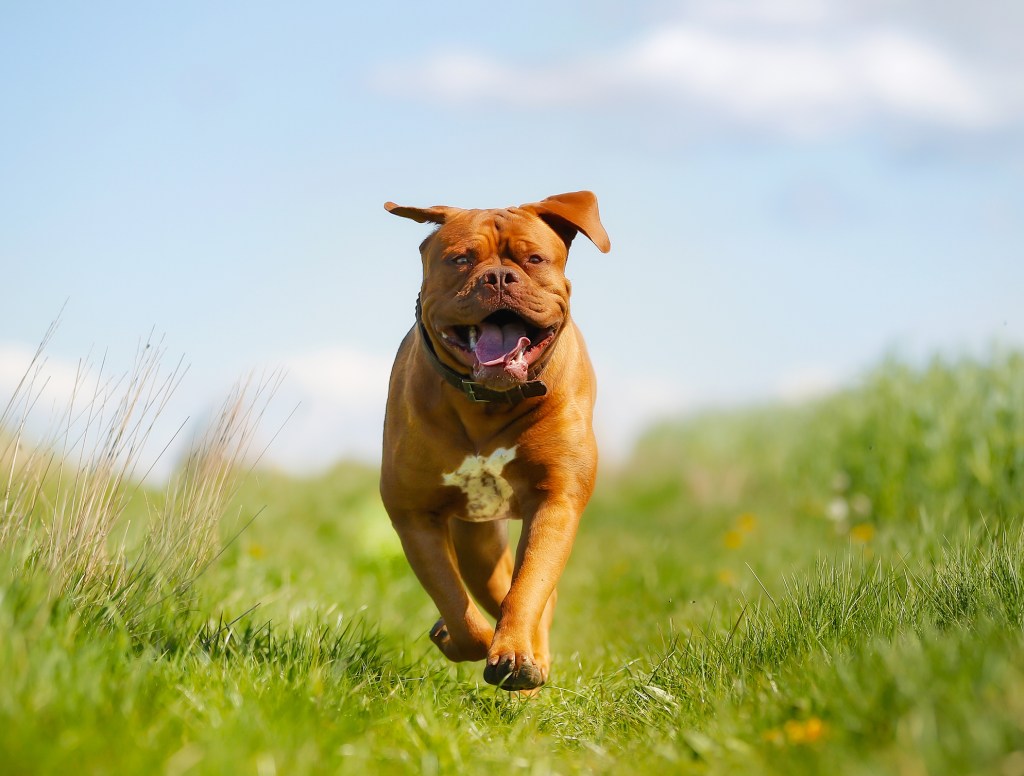
Cemented in popular culture thanks to a starring role in “Turner & Hooch,” the French Mastiff is a powerhouse of a breed. These iconic dogs boast a robust and muscular build, complete with that unmistakable wrinkled face. The Dogue de Bordeaux has a laid-back nature and craves strong bonds with family members. Whether sleeping on the kitchen floor or enjoying a play session in the backyard, the French Mastiff exudes strength, charisma, and a disarming friendliness. Be warned, they drool quite a bit.
Mastín español (Spanish Mastiff)
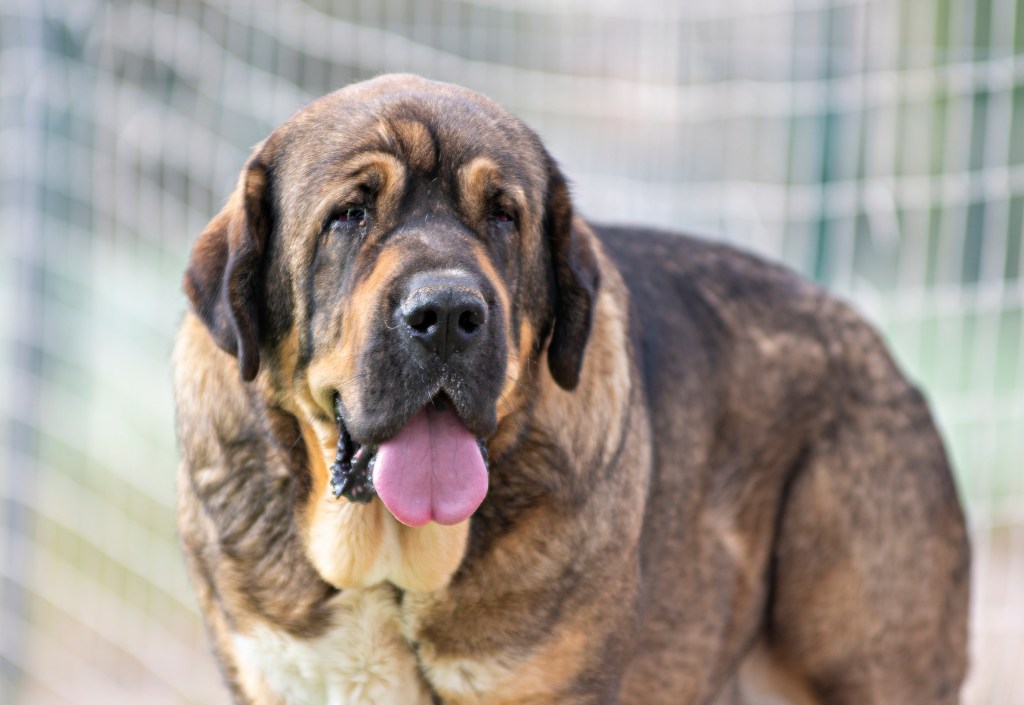
The Mastín español, also known as the Spanish Mastiff, were primarily used to guard sheep from wolves. Because sheep farming was a major economic driver in 10th century Spain, Spanish Mastiffs were deeply valued. With their massive build, broad head, and thick double coat, Spanish Mastiffs have a commanding presence. While Mastín Españols are affectionate with their families, they are also fearless protectors.
Boerboel (South African Mastiff)

Originating from South Africa, the Boerboel is a robust and muscular Mastiff breed specifically bred for homestead guarding. These giant dogs can quickly grow to 200 pounds! Whether patrolling the perimeter or standing watch over their human companions, this breed epitomizes the ideal combination of physical prowess and loyalty. With their assertive nature in mind, potential Boerboel owners may need to invest extra time in training and socialization to ensure they grow up well-adjusted.
Fila Brasileiro (Brazilian Mastiff)
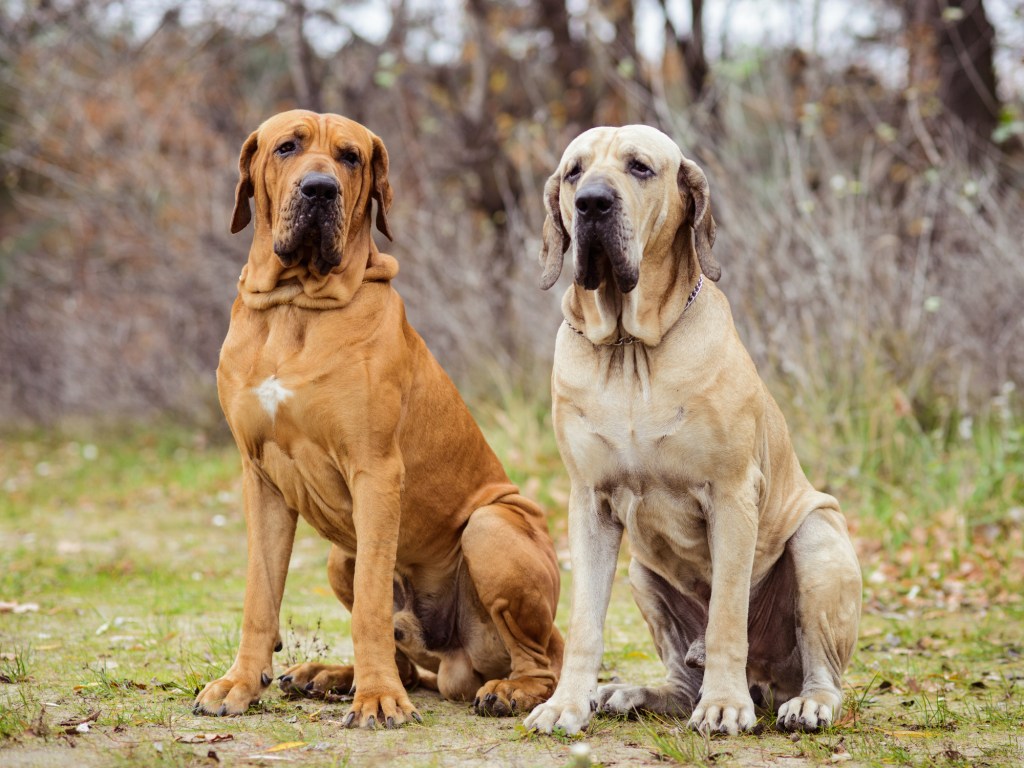
Docile, obedient, and determined, the Fila Brasileiro originated in Brazil. Highly intelligent, these giant working dogs excelled at cattle herding, big game hunting, and guarding. In addition to recognition for their exceptional tracking skills thanks to their Bloodhound lineage, the Brazilian Mastiff also earned a reputation as a reliable household guardian. With a unique appearance featuring loose skin and a beautiful brindle, black, red, or yellow coat, the Fila Brasileiro makes a standout choice for those seeking vigilant guardians with a softer side.
Mastín del Pirineo (Pyrenean Mastiff)

Not to be confused with the Great Pyrenees, the Pyrenean Mastiff is a large and agile livestock protector from Spain. Despite their size, these pups are surprisingly surefooted and quick. These adaptable dogs are also happy to snooze at home, watch over children, or vigilantly guard flocks in the pasture. While similar in demeanor and ability, these giant dogs can weigh twice as much as the Great Pyrenees, sometimes reaching 240 pounds. They are also known to bark much less than the Great Pyrenees.
Tosa Inu (Japanese Mastiff)

The Tosa Inu, originating from Japan, is a powerful and imposing breed known for their strength, courage, and dignified presence. Sadly, the Tosa Inu was initially bred for dog fighting and, as a result, possesses a formidable physique and can be quite tenacious. Even more tragic, these noble dogs are still used for dogfighting in parts of Japan where the practice is still legal. Due to their reputation for aggression, some countries outlawed the Japanese Mastiff entirely. Despite their imposing appearance and misunderstood nature, Tosa Inus can exhibit loyalty and gentleness toward their families if trained properly.
Dogo Argentino (Argentinian Mastiff)

The Dogo Argentino, otherwise known as the Argentinian Mastiff, was initially bred as a big-game hunting dog. Muscular and athletic with a striking, all-white coat, the Dogo Argentino is strong, agile, and fearless. Additionally, these impressive dogs showcase a broad head and expressive eyes to complement their enormous paws. With proper training and socialization, these dogs can make a wonderful addition to a family. Despite their naturally gentle demeanor, they’ve also gained a reputation for aggression. As a result, a number of countries banned the breed, as well as some cities in the United States.
Presa Canario (Canary Island Mastiff)

The Presa Canario, also known as the Canary Island Mastiff, is recognized by their distinctive brindle or fawn coat. The Presa Canario is a powerful working dog originally bred for guarding livestock and property. Because of their size, independent spirit, and exceptional intelligence, the Presa Canario requires consistent training and socialization. Still, proper guidance can channel their innate qualities, making them a well-adjusted and easygoing companion.
Cane Corso (Italian Mastiff)
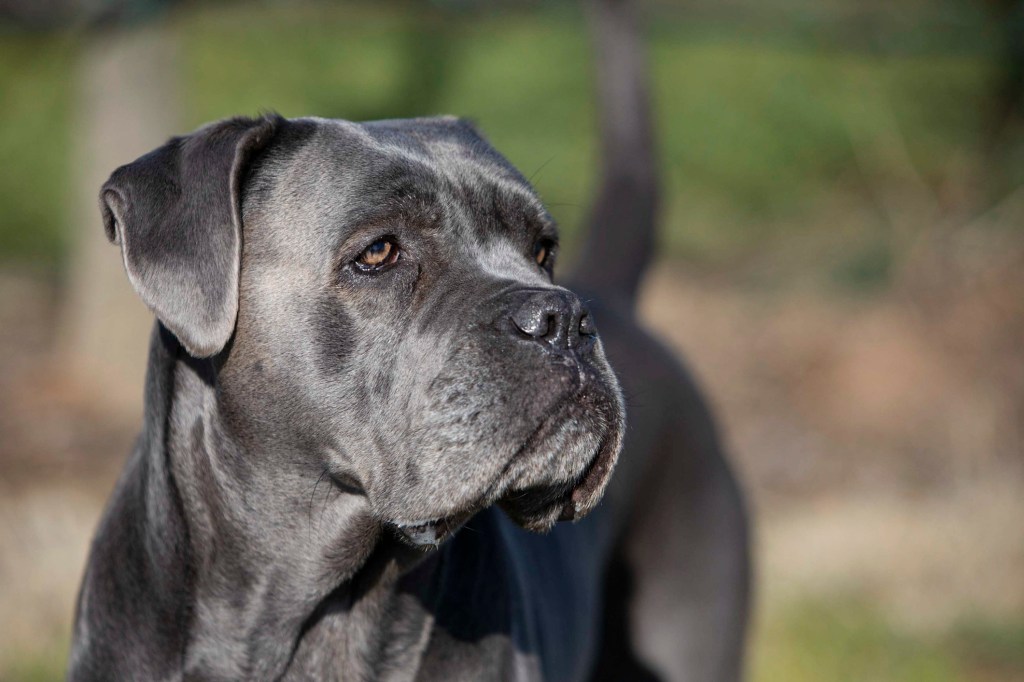
The Cane Corso, originating from Italy, is a majestic and muscular breed known for their strength, agility, and imposing stature. With a distinctive large head, strong jaw, and a short, dense coat that comes in various colors, the Cane Corso has become widely popular in recent years. Originally bred as a guardian and hunter, the Italian Mastiff possesses a confident and assertive temperament to go along with their regal appearance. To that end, they require early socialization and consistent training. Fortunately, they are highly eager to please, which should make training moderately easy.
“Puppies for sale?” Consider adoption instead
While these Mastiff breeds make wonderful companions, we always recommend beginning your search at shelters and rescue organizations. Mastiff puppies may be available in rescues if you’re looking for a a younger dog for early socialization. If you choose to purchase a Mastiff puppy, it’s crucial to invest time in finding a reputable breeder, particularly considering potential health issues with giant dog breeds. Reputable breeders care about the health of their puppies, whereas backyard breeders prioritize profit.
Owners of Mastiff breeds shoulder the responsibility of carefully socializing and training these formidable dogs and navigating their instincts without encouraging overprotectiveness or aggression. This commitment is pivotal in creating a harmonious relationship between Mastiffs and their human family. Notably, potential owners should be aware that most guardian breeds may not be ideal for first-time dog owners. Mastiffs require committed, consistent, and thorough training. The strength and protective nature of the breed-type demand a dedicated training approach to ensure they evolve into well-adjusted and trustworthy family companions.
